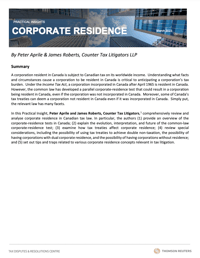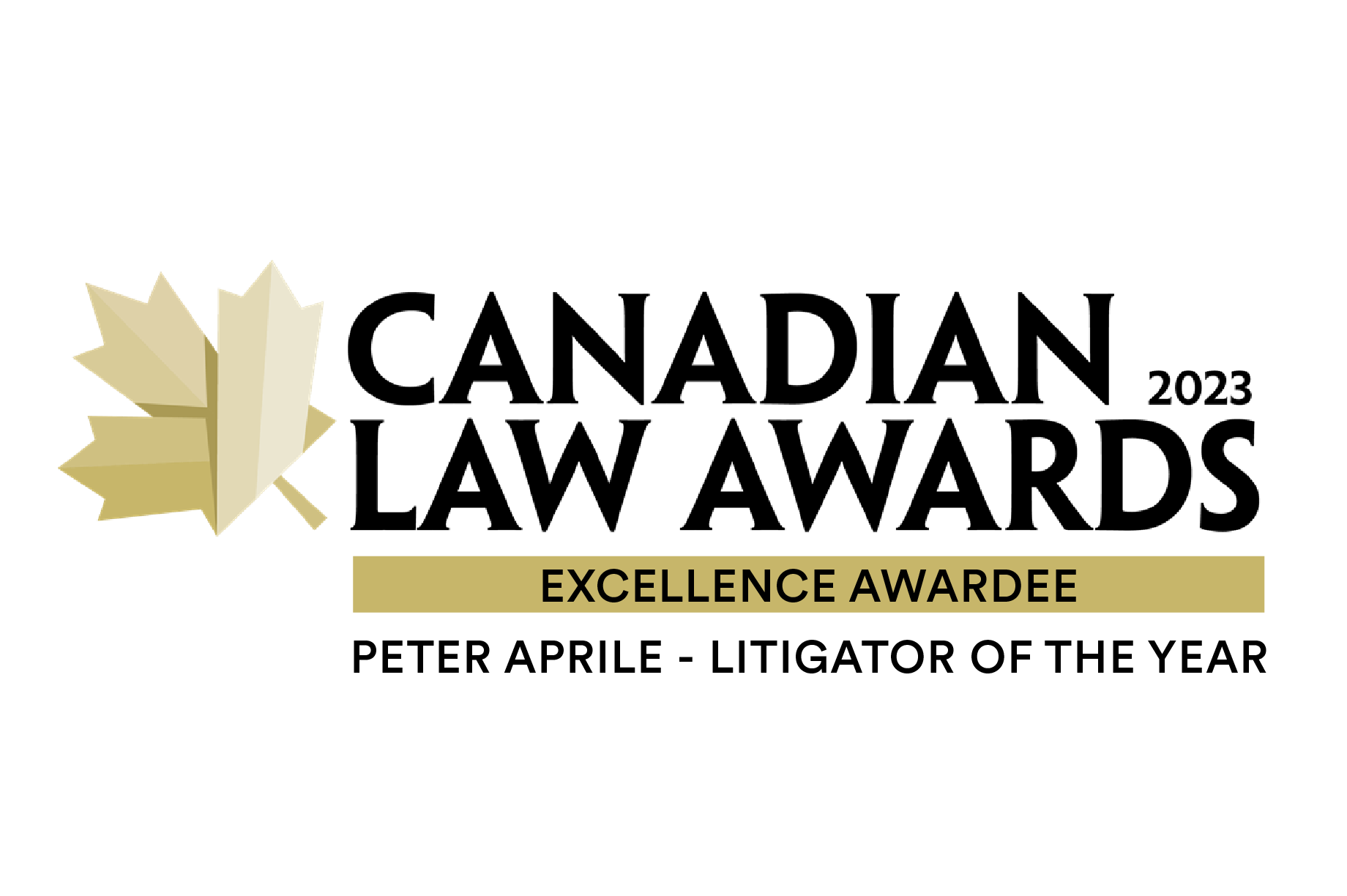
Thompson Reuters considers the authors “leading tax experts and litigators”. The authors agreed to grant TR partial rights to this work. This article first appeared in TR’s, Practical Insights in May 2020.*
Canada’s tax treaties are the third factor that may impact corporate tax residence. (The first two are the statutory test and the common-law test.) Canada currently has tax treaties with 97 countries.
Canada’s Tax Treaties
 Tax treaties are bilateral agreements between Canada and one other country (referred to in the treaties as “contracting states”). The purpose of a tax treaty is to prevent double taxation and double non-taxation (i.e., tax evasion).
Tax treaties are bilateral agreements between Canada and one other country (referred to in the treaties as “contracting states”). The purpose of a tax treaty is to prevent double taxation and double non-taxation (i.e., tax evasion).
This article focuses exclusively on the treaty articles that relate to corporate residence and the dispute process when a corporation alleges that Canada and the other treaty country tax the corporation in a manner that is inconsistent with the tax treaty.
Tax Treaty Impact on Residence under the ITA
Tax treaties provide that individuals and corporations can only be resident in one of the contracting states. This principle ensures that taxpayers will not be subject to double taxation. The tax treaties set out various tiebreaker provisions to apply when a taxpayer is considered resident in both contracting states.
If the tiebreaker provisions result in the taxpayer being resident in Canada and not the other contracting state, the tax treaty deems the taxpayer resident in Canada. Similarly, if the tiebreaker provisions result in the taxpayer being resident in the other contracting state and not Canada, the treaty deems the taxpayer resident in the other contracting state.
If a tax treaty between Canada and another contracting state deems a corporation resident in another contracting state, the ITA, at subsection 250(5), deems the corporation not resident in Canada for the purposes of the ITA.
If a corporation is resident in Canada and another country, but Canada does not have a tax treaty in force with the other country, the corporation does not benefit from any relieving provisions and will continue to be subject to tax in Canada as a corporation resident in Canada.
_AquaBlueFlat.jpg?width=4000&height=1771&name=CounterBlogPattern(2)_AquaBlueFlat.jpg)
Canada’s tax treaties are based on the OECD’s model tax treaty. In addition to providing a model tax treaty, the OECD also provides a detailed commentary that is an extremely valuable tool when attempting to interpret the provisions of Canada’s tax treaty.1 However, Canada’s tax treaties do not necessarily follow the OECD Model Treaty in every respect. Specifically, most of Canada’s tax treaties use a different tiebreaker when a corporation is resident in both Canada and the treaty partner.
Corporate Residence in the OECD Model Treaty
The OECD Model Treaty, at Article 4, provides information related to corporate residence. Specifically, Article 4.1 states the following:
For the purposes of this Convention, the term “resident of a Contracting State” means any person, who under the laws of that State, is liable to tax therein by reason of his domicile, residence, place of management or any other criterion of similar nature, and also includes that state and any political subdivision or local authority thereof. This term, however, does not include any person who is liable to tax in that state in respect only of income from sources in that State or capital situated therein.2
Article 4.2 sets out the tiebreaker rules if an individual is resident in both contracting states; Article 4.2 is irrelevant for determining corporate residence.3
Article 4.3 establishes that, if a corporation is considered resident in both contracting states under the treaty, the corporation shall be resident in the place of the corporation’s effective management:
Where by reason of the provisions of paragraph 1 a person other than an individual is a resident of both Contracting States, then it shall be deemed to be a resident of only one of the States in which its place of effective management is situated.4
Article 4 is a relieving provision ensuring that a corporation is not subject to tax on the same income or capital gain in two jurisdictions.
_AquaBlueFlat.jpg?width=4000&height=1771&name=CounterBlogPattern(2)_AquaBlueFlat.jpg)
The OECD Model Treaty commentary provides that, “the place of effective management is the place where the key management and commercial decisions that are necessary for the conduct of the entity’s business as a whole are in substance made.”5
It is unclear whether the “place of effective management” has the same meaning as “central management and control” or whether it means effective or actual control (i.e., the decisions of the executives that implement the directors’ strategic management decisions).
It is also possible that “place of effective management” is a hybrid of central management and control and executive management.
However, as set out below, Canada’s tax treaties steer clear of “place of effective management” as the primary tiebreaker for corporate residence and, therefore, the uncertainty is more of an academic issue than a practical issue in Canada.
Corporate Residence in Canada’s Tax Treaties
Generally speaking, Canada’s tax treaties adopt the definition of “resident of a Contracting State” in Article 4.1 of the OECD Model Treaty. However, Canada’s tax treaties do not adopt the same “place of effective management” tiebreaker in Article 4.3 of the OECD Model Treaty.
Instead, Canada’s tax treaties employ the following tiebreakers for corporations that are resident in both contracting states:
- approximately 60 percent of Canada’s tax treaties use place of incorporation as the primary corporate-residence tiebreaker and, if the place of incorporation does not break the tie, the secondary tiebreaker is an agreement between the two countries’ competent authorities;
- approximately 40 percent of Canada’s tax treaties use an agreement between the two countries’ competent authorities as the only corporate residence tiebreaker.6
Citations
1 OECD (2015), Model Tax Convention on Income and on Capital 2014 (Full Version), OECD Publishing.
2 Ibid. at 37.
3 Ibid.
4 Ibid.
5 Ibid. at 192.
6 Geoffrey Loomer, “The Disjunction Between Corporate Residence and Corporate Taxation: Is Improvement Possible?” (2015) 63:1 Can. Tax J. 111, citing United Kingdom, Inland Revenue, Statement of Practice 1/90, at para. 11 (reproduced in United Kingdom, HM Revenue & Customs, International Manual (London: HMRC, 2014), online at: https://www.gov.uk/hmrc-internal- manuals/international-manual/intm120200), at 122-123.

.jpg?width=120&name=Counter%20Tax%20Litigators%20Logo%20Stacked%20(MidnightBlue%20on%20White).jpg)












.png?width=400&height=400&name=CT-How_Can_We_Help-22_july_NewGraphic_b(small).png)

.png?width=1386&height=1224&name=2025%20Legal500%20Elite%20Boutique%20Award%20(Badge).png)
.png?width=1386&height=1224&name=ITR%20Finalist%20Practice%20Leader%20of%20Year%20Peter%20Aprile%202024%20(Badge).png)
.png?width=1386&height=1224&name=2025%20Legal500%20Leading%20Firm%20Client%20Satisfaction%20Award%20(Badge).png)





.png?width=1386&height=1224&name=ITR%20Tax%20Innovator%20Finalist%202024%20Award%20(Badge).png)




